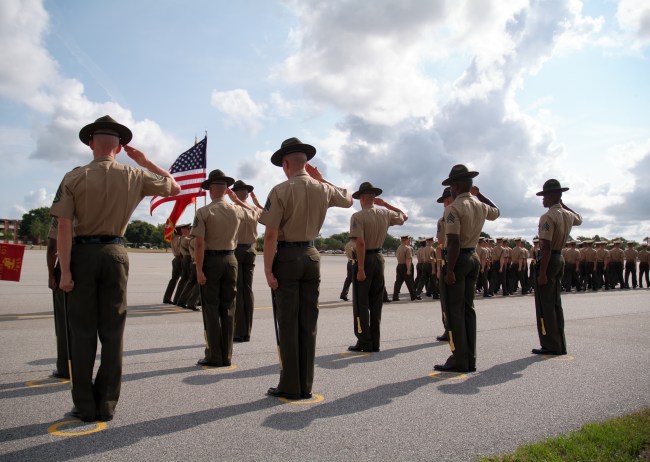
iStockphoto / paladex
The U.S. Marine Corps may want to think about changing its popular slogan “the few, the proud,” to something more along the lines of “turn on, tune in and drop out.” Once associated with those bulldog tattoos, this branch of the military is apparently dropping more lysergic acid diethylamide, otherwise known as LSD, than old Uncle Sam feels comfortable with. Drug tests for acid are now going around Marine bases across the country like a bad case of crabs because soldiers are having a hallucinogenic heyday unlike any we’ve seen since the Department of Defense began dosing them with it decades ago.
To hear some tell it, it is the jarheads at Camp Lejeune in North Carolina that are causing all the trouble. Marines there have been using a lot of acid in 2020. So much that the base has been forced to tweak its drug testing protocols to try and catch these glassy-eyed bastards. Although Marines were once only checked for mind-altering drugs like LSD if an officer had probable cause to do so (perhaps one was getting a little too philosophical for his own good) the whiz quiz has become more prevalent at Camp Lejeune now that more soldiers are being deployed to Strawberry Fields.
“We have a drug problem in the 2d Marine Division,” the unit’s commanding general, Major General Francis L. Donovan, said in a statement. “We are committed to identifying violators of our ethos.”
Camp Lejeune has reportedly doled out somewhere around 4,000 drug tests since the summer — all in an effort to track down the order of the sunshine soldiers. “This testing led to numerous positive results,” the division said, without giving a definitive number. But rest assured, the tripped-out toll has been substantial enough to warrant additional efforts for reeling in the minds of these killers. They want Marines itching to go to war, not getting into in-depth discussions about life, the meaning of existence, and whether or not Pink Floyd is music or religion.
Therefore, Marines will continue being tested for acid on a more “consistent basis.” And anyone who fails runs the risk of nonjudicial punishment, a dishonorable discharge, or imprisonment. “Zero tolerance is the Marine Corps’ stance, and Marines need to understand that there is no drug that they can take without the means for government detection,” said Lt. Col. Christian Ruwe.
It’s kind of funny that more Marines are finding solace in LSD these days. It was just decades ago that the federal government was experimenting on soldiers to determine whether this drug (and others like it) could be used on the battlefield. No kidding. Dr. James Ketchum, an Army psychologist, conducted experiments with hallucinogens in the 1950s and 60s. His sole mission was to see if the U.S. military could still incapacitate the enemy by using psychedelic drugs as an alternative to “bombs and bullets.” This was long before the United Nations decided that chemical weapons were foul play in the trenches of war. Still, up until the time of his death in 2019, Ketchum argued that using acid was “more humane than conventional weapons currently being used.”
Unfortunately, the switch was never going to happen. The use of “chemical weapons” is still too Hitlertarian for most Americans. They would rather the United States continue blowing people up in pursuit of its agenda than trying to stop opposing forces with confusion and laughter. And that’s all LSD really did to soldiers – made them happy. While some who were part of the experiments reportedly did all sorts of bizarre things, others had violent reactions to the drug. Some later said in exit interviews that those maniacal outbursts were to escape people wanting to kill them.
For the most part, however, a large portion of the subjects just relished in uncontrollable laughter. Nevertheless, the Defense Department made the decision to shut down the program by 1970.
Using LSD in the military is a concept that has been resurrected in the past couple of years. Not as a way to immobilize the enemy, but to enhance the creative problem-solving process of U.S. soldiers. In early 2019, Marine Major Emre Albayrak wrote a piece in the Marine Corps Gazette revealing how microdosing hallucinogenic drugs, like LSD and psilocybin, could help soldiers gain the upper hand. These drugs “enhance cognitive function and flexibility, lateral thinking and creativity, elevate mood, and decrease DMN activity,” the author wrote. “These factors allow the brain to operate in a manner free of preconceived notions or boxes, resulting in greater creative problem-solving abilities.”
The article also points out that psychedelics are among the safest classification of drugs – more so than alcohol – the most dangerous one of all. The U.S. military permits soldiers to drink booze despite research showing that it destroys cognitive function. But LSD, psilocybin, and even pot remain a no-no. As far as we know, the Pentagon isn’t officially looking into psychedelic warfare or electric-kill aid. Though it sounds like the crew at Camp Lejeune might have a decent amount of preliminary findings to share with them if they happen to change their mind.